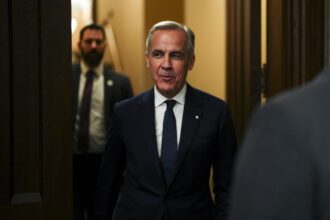The political tides may be shifting along Canada’s northwest coast as Alberta’s Energy Minister Brian Jean returns from northern British Columbia with renewed optimism about the potential reversal of the controversial oil tanker moratorium. Following high-level discussions with Indigenous leaders and local officials, Jean’s recent diplomatic mission signals a possible breakthrough in a long-standing economic impasse that has frustrated Alberta’s energy ambitions.
“The conversations were remarkably productive,” Jean told reporters upon his return to Edmonton. “We’re seeing a genuine openness from coastal communities to revisit the tanker ban legislation with fresh perspectives on economic benefits, environmental safeguards, and Indigenous partnerships.”
The federal Oil Tanker Moratorium Act (Bill C-48), enacted in 2019, effectively blocked Alberta’s access to Asian markets via northern B.C. ports by prohibiting oil tankers carrying more than 12,500 metric tons of crude oil from stopping or unloading along B.C.’s northern coast. The legislation has been a significant point of contention between the two provinces, with Alberta viewing it as an unfair restriction on its economic development.
What’s changed since 2019 is the economic landscape in many northern communities. Several Indigenous groups who initially supported the ban are now reconsidering their position in light of potential economic partnerships and revenue-sharing agreements that could address persistent unemployment and limited economic opportunities in their regions.
Chief Harold Leighton of the Metlakatla First Nation, who participated in the discussions, emphasized the evolution in thinking. “Five years ago, the conversation was primarily about environmental risk. Today, we’re discussing world-class safety protocols, meaningful Indigenous equity participation, and sustainable development models that could transform our communities.”
The potential reversal comes at a critical juncture for Canada’s energy sector. With global energy security concerns heightened by international conflicts and market volatility, access to diverse export markets has taken on renewed strategic importance. According to CO24 Business analysis, opening northern B.C. ports to Alberta oil exports could generate an estimated $7.5 billion in annual economic activity and create thousands of jobs across multiple provinces.
Environmental organizations remain firmly opposed to any reconsideration of the tanker ban. Sierra Club BC spokesperson Jennifer Skene cautioned against what she called “short-term economic thinking.” “The ecological risks to this pristine coastline haven’t changed. One major spill could devastate marine ecosystems and coastal economies for generations,” Skene noted in a statement.
The federal government has maintained a cautious stance on the issue. Federal Transport Minister Pablo Rodriguez acknowledged the ongoing discussions but emphasized that any potential policy changes would require extensive consultation and environmental assessment. “We understand the economic considerations, but our commitment to protecting Canada’s coastlines remains paramount,” Rodriguez stated during a recent visit to Canada.
Premier Danielle Smith of Alberta views the potential reversal as a critical component of her province’s economic strategy. “Alberta’s resources deserve access to global markets at fair prices,” Smith said at a recent energy conference. “The current restrictions effectively landlocked our products, forcing us to sell at discounted rates to a single market.”
The next steps will likely involve more formal discussions between federal officials, provincial representatives, and Indigenous leaders. Jean indicated that a working group is being established to address key concerns around marine safety, environmental protections, and economic benefits distribution.
As this policy reconsideration unfolds, both supporters and opponents are preparing for what could be a contentious national debate about Canada’s energy future, environmental priorities, and reconciliation with Indigenous peoples. The ultimate decision will require balancing regional economic interests with national environmental commitments and Indigenous rights—a delicate equation in Canadian politics.
What remains to be seen is whether this emerging coastal coalition can generate enough political momentum to prompt federal reconsideration of a policy that was central to the Trudeau government’s environmental platform. As global energy markets continue to evolve rapidly, can Canada find a balance that addresses both legitimate environmental concerns and the economic imperatives of resource-dependent communities?


















